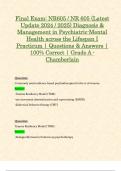Final Exam: NR605 / NR 605 (Latest
Update ) Diagnosis &
Management in Psychiatric-Mental
Health across the Lifespan I
Practicum | Questions & Answers |
100% Correct | Grade A -
Chamberlain
Question:
Commonly used evidence-based psychotherapies for the tx of trauma:
Answer:
-Trauma Resiliency Model (TRM)
-eye movement desensitization and reprocessing (EMDR)
-dialectical behavior therapy (DBT)
Question:
Trauma Resiliency Model (TRM)
Answer:
-biologically based or bottom-up psychotherapy
,-helps support clients in processing acute or cumulative trauma once
preliminary stabilization skills have been learned
Question:
eye movement desensitization and reprocessing (EMDR)
Answer:
-bottom-up psychotherapy
-helps clients in accessing & processing traumatic memories
Question:
dialectical behavior therapy (DBT)
Answer:
-cognitive or top-down approach
-support self-regulation after trauma
Question:
Primate/Human Brain (Cortex)
Answer:
-Responsible for: Higher mental functions
-Core functions: Regulating attention, feelings, and desires, complex
reasoning, abstract thoughts, imagination, language, empathy
-Basic "need": Connection and attachment to others
,-When need is met: We feel LOVE
-When need is not met: We experience HEARTACHE
Question:
Mammalian Brain (Subcortical region)
Answer:
might think of it as the little mouse part of the brain.
-Responsible for: Feelings and memory formation
-Core functions: Emotions, learning and memory, reward/motivation
-Basic "need": Satisfaction and approaching rewards
-When need is met: We feel CONTENTMENT
-When need is not met: We experience FRUSTRATION
Question:
Reptilian Brain (Brain stem and cerebellum)
Answer:
-Responsible for: Survival and maintenance
-Core functions: Regulating heartbeat, breathing, and other vital organs
-Basic "need": Safety and avoiding harm
-When need is met: We feel PEACE
-When need is not met: We experience FEAR
, Question:
Trauma
Answer:
-any incident or series of events that overwhelm an individual's ability to cope
-What happens inside us as a result of what happens to us
-may be emotionally disturbing or life-threatening
-may have enduring effects on emotional, psychological, physical, and
spiritual well-being
-70% of adults in U.S. report having had a traumatic experience
Question:
that at increased risk of experiencing a traumatic event
Answer:
gay, lesbian, bisexual, transgender, people of color, low education &
socioeconomic status
Question:
experiences that may be traumatic include:
Answer:
-physical, sexual, and emotional abuse
-childhood neglect
-living with someone with mental health or substance use disorders




